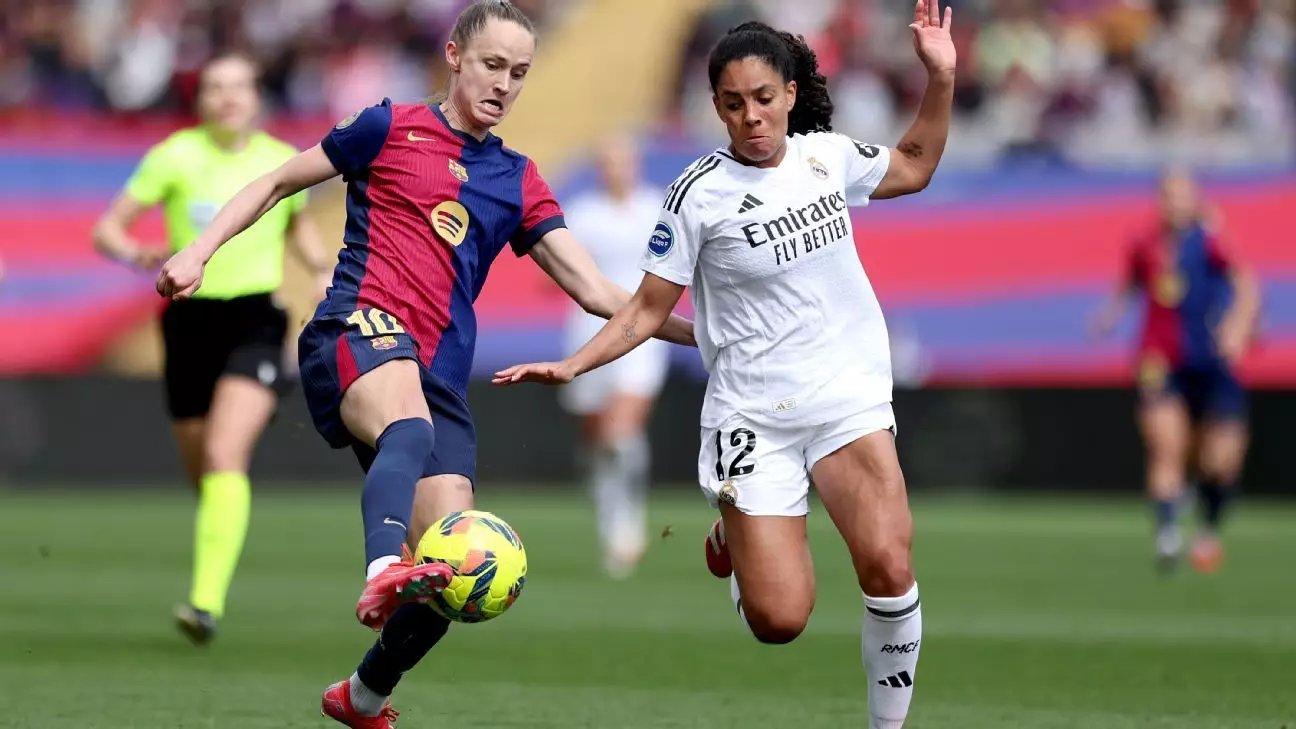In a thrilling encounter that reverberated through the Olympic Stadium, Real Madrid women’s team not only secured their inaugural victory over rivals Barcelona in the Clásico but also showcased their potential to challenge for the Liga F title. Caroline Weir emerged as the star of the evening, scoring twice in the dying moments of the match, sealing a 3-1 triumph. This match, held on a cloudy Sunday, marked a significant turning point, not just for the scoreboard but for the psyche of a team that had suffered 18 consecutive losses to its fiercest rival since its inception in 2020.
Weir’s late surge is indicative of the “never give up” ethos that defines great teams. Coming off the bench, her contributions proved vital as she maneuvered into position to net a well-timed goal, showcasing not just her technical skill but her awareness on the field. The first goal, a neat finish from Linda Caicedo’s cutback in the 87th minute, was the culmination of not just individual effort but teamwork that has been increasingly evident under the management of Alberto Toril. With the clock ticking away, Weir’s second goal in stoppage time exemplified Madrid’s transition from being a team that “plays to compete” to one that “plays to win.”
Controversy and Missed Opportunities
Before Weir took center stage, the match brimmed with drama, including a controversial offside decision that robbed Barcelona of what seemed like a well-deserved second goal from Jana Fernández. Despite the absence of VAR, which would have simplified matters, the linesman’s call stood unchallenged. This moment serves as a reminder of the persistent necessity for technological advancements in women’s football, where crucial moments can turn the tide in a match.
Meanwhile, Barcelona initially gained the upper hand through Alba Redondo’s headed goal, showcasing their attacking prowess. However, they stumbled with several missed opportunities, most notably by Caroline Graham Hansen, who misfired in critical moments. The contrast between her promising abilities and the ineffectiveness she displayed that night drew attention to the pressure that comes with high-stakes matches. In high-impact games, failure to convert chances can shift momentum, and that’s exactly what transpired for Barcelona as Madrid began to capitalize on the nerves evident in their opponents’ play.
Ride on the Emotional Roller Coaster
The emotional dynamics of the game swung like a pendulum. After a highly competitive first half, Madrid appeared marginalized and on the verge of yet another failure to their storied rivals. Instead of succumbing to the pressure, however, the young team rallied, answering their critics with a steely resolve. Players like Misa Rodríguez rose to the occasion, producing spectacular saves that frustrated Barcelona’s forwards, thus swinging the tide back in Madrid’s favor.
By the time Weir struck twice, the emotional contrasts were palpable. Fans who arrived hopeful but anxious turned delirious as they witnessed history unfold—with many feeling an overwhelming sense of pride in their team’s persistence and dedication. The sentiment was clear: this was not merely a match won; it was a shifting of paradigms. For players and supporters alike, the victory symbolized resilience forged through hardships and a change of fate that could inspire future performances down the road.
The Road Ahead: Challenges and Opportunities
As Madrid relishes this monumental victory, it faces the formidable challenge of maintaining this momentum. With several matches left in the Liga F season, the stakes for both Madrid and Barcelona have intensified. For Madrid, the roadmap ahead will not be without hurdles, especially with UEFA Champions League duties looming—prompting the need for squad rotation and strategic planning.
On the flip side, Barcelona must grapple with the fallout of this defeat. As the league leaders, they are still in a powerful position, yet the pressure is undeniably mounting. The team must recover quickly, focusing on not only securing their title aspirations but also ensuring their mental fortitude as they return to the pitch.
Ultimately, this Clásico is a clear testament to the exhilarating unpredictability of football—a game where underdogs can rise spectacularly, and where late-emerging heroes can reshape narratives against formidable rivals. For Real Madrid, the triumph is more than just the coveted three points; it is a solid reminder that they have arrived on the biggest stage of women’s football, ready to compete fervently.


Leave a Reply